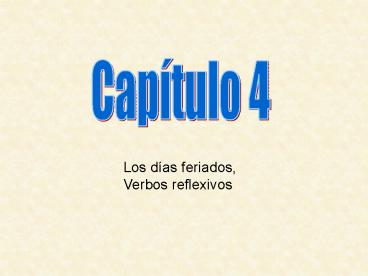Captulo 4 - PowerPoint PPT Presentation
1 / 5
Title:
Captulo 4
Description:
... va al rev s, es decir que va primero el d a, despu s el mes, y despu s el a o) ... Santa Claus. Champa a = champagne. Disfraces = costumes. Velas = candles ... – PowerPoint PPT presentation
Number of Views:47
Avg rating:3.0/5.0
Title: Captulo 4
1
Capítulo 4
Los días feriados, Verbos reflexivos
2
Los días feriadosQué día asocias con ______?
- El cuatro de julio (4-7-08 En español, la fecha
va al revés, es decir que va primero el día,
después el mes, y después el año) - Conejos bunnies
- Papá Noel Santa Claus
- Champaña champagne
- Disfraces costumes
- Velas candles
- Pavo turkey
- Ayuno fasting
3
Reflexive VerbsDos mundos, p. 172-173
- A verb is reflexive when the subject and object
are the same. - English uses words that end in self for this
idea - I wash myself. (As opposed to I wash the car.)
- He talks to himself. (As opposed to He talks to
me.) - Spanish reflexive verbs are for actions that
people do to themselves. - Reflexive verbs are still ar, -er, or ir, but
they also end in -se - lavarse to wash oneself (As opposed to lavar
to wash) - ponerse la ropa to dress oneself (As opposed
to just poner) - There is also an extra step to take when
conjugating
levant
ar
se
levantarse
levantamos
nos
levanto
me
(yo)
(nosotros/as)
-----
te
levantas
(tú)
levanta
levantan
se
se
(él/ella/ud)
(ellos/ellas/uds)
For right now, youll only need to worry about
this stuff for the verbs in the box on p. 173.
(But youll see more of this later!)
4
Más práctica con verbos reflexivos
- bañarse
- me baño
- te bañas
- se baña
- nos bañamos
- -----
- se bañan
- me does NOT equal I (te ? you, se ? he/
she/it, nos ? we, etc.) (to say those, we say
yo, tú, Ud./él/ella, nosotros, Uds., ellos/as - There is a tendency at this point to want to make
all verbs reflexive. Resist! Most verbs arent
reflexive.
For right now, youll only need to worry about
reflexives for the verbs in the box on p. 173
dealing with daily routine kinds of things. (But
of course, youll see more of them later!)
5
Qué se hacen en su rutina diaria?
- Se maquilla.
- Se despierta.
- Se afeita.
- Se seca.
- Se lava los dientes.
- Lava su camión.
Remember - Not all verbs are reflexive - Hes not
washing himself, so its not reflexive!
- Se peina.
- Se ducha.































